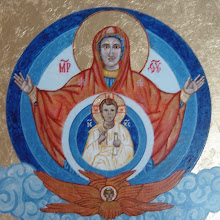In this time it happed that there was at Rome a dragon in a pit, which every day slew with his breath more than three hundred men. Then came the bishops of the idols unto the emperor and said unto him: O thou most holy emperor, sith the time that thou hast received christian faith the dragon which is in yonder fosse or pit slayeth every day with his breath more than three hundred men. Then sent the emperor for Saint Silvester and asked counsel of him of this matter. Saint Silvester answered that by the might of God he promised to make him cease of his hurt and blessure of this people. Then S Silvester put himself to prayer, and Saint Peter appeared to him and said: Go surely to the dragon and the two priests that be with thee take in thy company, and when thou shalt come to him thou shalt say to him in this manner: Our Lord Jesu Christ which was born of the Virgin Mary, crucified, buried and arose, and now sitteth on the right side of the Father, this is he that shall come to deem and judge the living and the dead, I commend thee Sathanas that thou abide him in this place till he come. Then thou shalt bind his mouth with a thread, and seal it with thy seal , wherein is the imprint of the cross. Then thou and the two priests shall come to me whole and safe, and such bread as I shall make ready for you ye shall eat. Thus as Saint Peter had said, Saint Silvester did. And when he came to the pit, he descended down one hundred and fifty steps, bearing with him two lanterns, and found the dragon, and said the words that Saint Peter had said to him, and bound his mouth with the thread, and sealed it, and after returned, and as he came upward again he met with two enchanters which followed him for to see if he descended, which were almost dead of the stench of the dragon, whom he brought with him whole and sound, which anon were baptized, with a great multitude of people with them. Thus was the city of Rome delivered from double death, that was from the culture and worshipping of false idols, and from the venom of the dragon. At the last when Saint Silvester approached towards his death, he called to him the clergy and admonished them to have charity, and that they should diligently govern their churches, and keep their flock from the wolves. And after the year of the incarnation of our Lord three hundred and twenty, he departed out of this world and slept in our Lord.
It is also New Year's Eve, and it is customary to say a Te Deum on this day in thanksgiving for God's blessings in the past year. Here are two Te Deum's in thanksgiving for 2011.





























